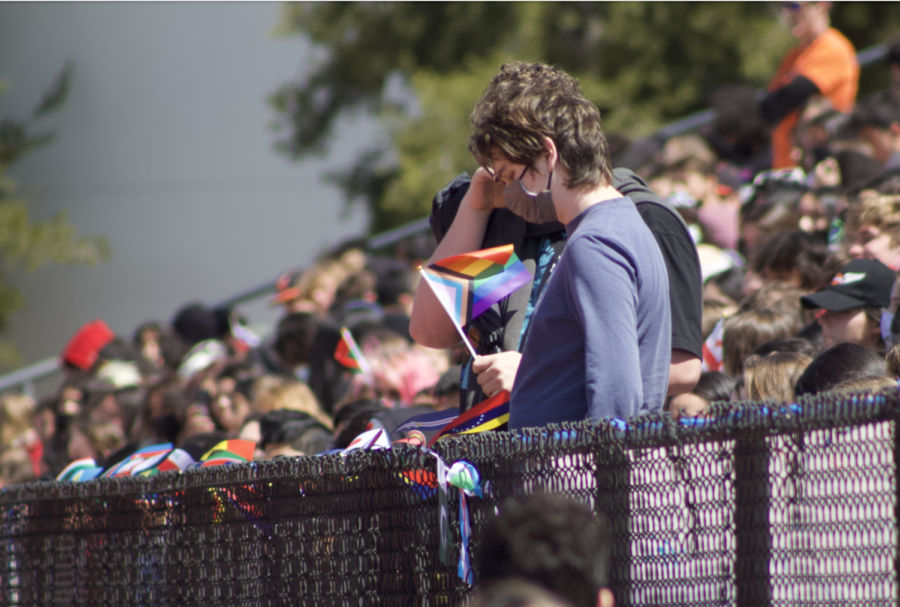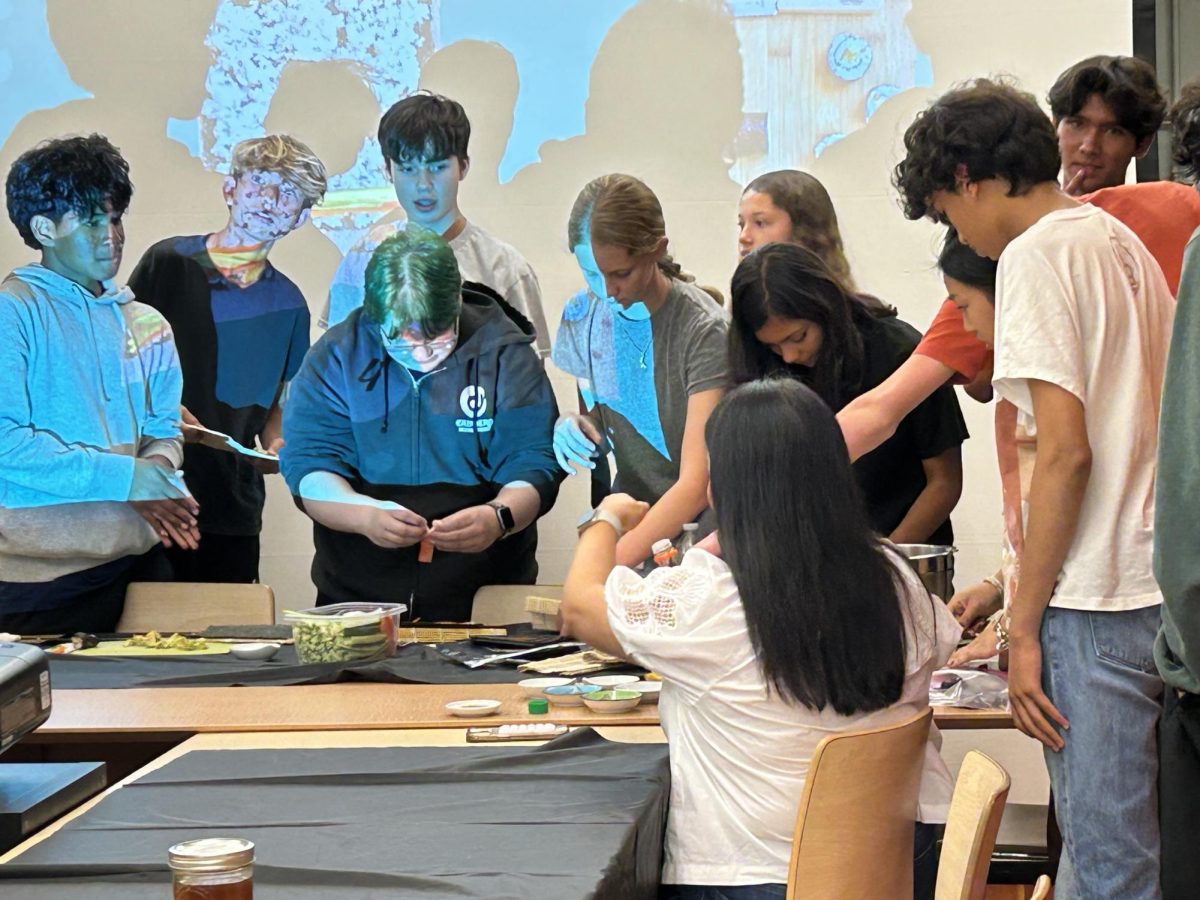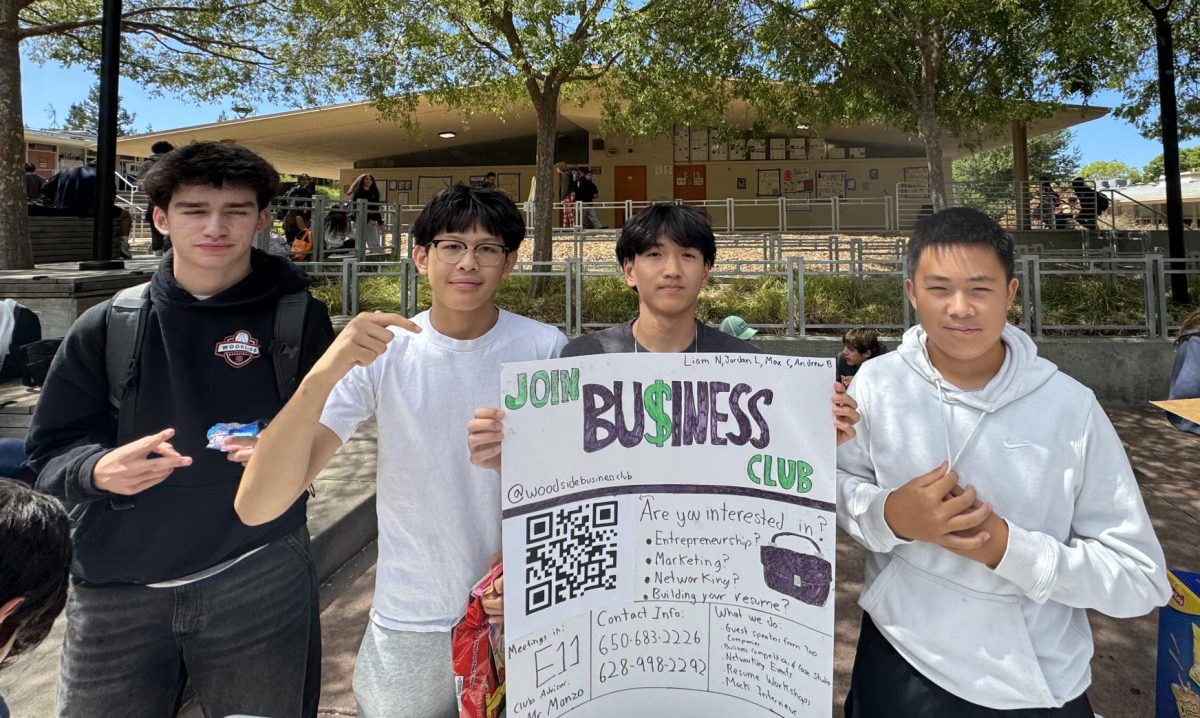“Don’t say gay?” That is what many members and allies of the LGBTQ+ community here at Woodside said in unison after The Parental Rights in Education bill, more known as the “Don’t Say Gay” bill, was passed by the Florida Senate and House, then signed by Governor Ron DeSantis on March 28, 2022.
The bill sparked controversy due to its limitation on what classrooms can teach about gender identity, sexual orientation, and parental involvement. The bill will come into effect on July 1, 2022. Additionally, all Florida’s school district plans must be updated by June 2023. The bill focuses on the age group between kindergarten and third grade, banning instruction or classroom discussion about LGBTQ+ issues. Beyond those grades, conversation and discussion must be “age-appropriate.” The bill, however, does not clarify what “age-appropriate” means.
“[The bill is] very intentional and targeted to ingrain these ideals into young kids because it’s easier to ‘catch them’ before they can learn to accept and understand,” sophomore Maya Wik said. “Which it’s tough when you learn [from] school most of your life. They’re [not] teaching [gender identity and sexual orientation], and that will stick with them for the rest of their lives.”
The bill allows parents to sue districts and teachers who talk about LGBTQ+ issues and topics with the district’s funding.
“The fact that parents can sue over a teacher’s conversation on sexuality, or just the topic of the LGBTQ+ community is crazy to me,” senior Ray Hernandez said. “Because what if a kid comes up to a teacher and asks, ‘What’s the LGBTQ+ community?’ and a parent hears that and [then sues]. That could end a teacher’s career and give them a bad reputation for something that should be talked about.”
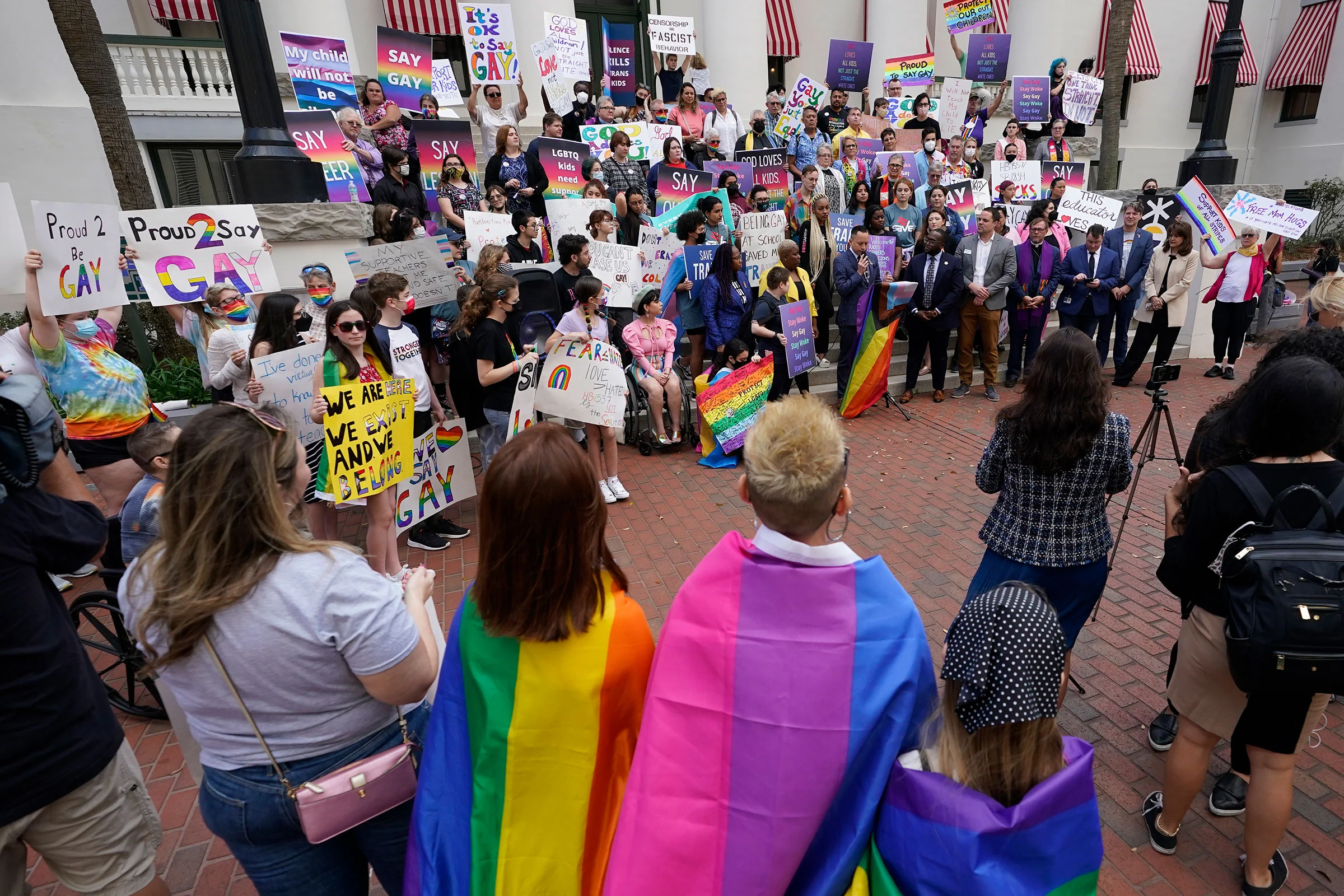
Some say that a bill limiting education and or LGBTQ+ rights and its passing was inevitable, with over 240 anti-LGBTQ+ bills being introduced in nearly 40 states in the U.S so far this year.
“Maybe it’s just Gen Z apathy, but my initial reaction was disappointment,” senior Jayden Maxham stated. “As disgusting and revolting as the bill is, it is so in line with recent political news that I was too exhausted to feel any more violent emotions. “
Others, like sophomore Kate Gray, were exasperated at the blunt homophobia of the bill’s supporters, the state of Florida, and the other states following suit.
“I was unfortunately not shocked that Florida, and now other southern states, would be enacting this kind of offensive and child-like legislation,” Gray stated. “It makes me incredibly angry that the citizens of these states have elected officials with prejudice, closed-mindedness, and lack of respect for diversity to represent them in government.”
Furthermore, old-school belief seemed to be in full bloom this spring as conservative news hosts, leaders, intellects, and Congress members claimed that this bill protects against teachers from “grooming” kids from the influence and members of the LGBTQ+ community. Anit-LGBTQ+ supporters are coming together stating “okay, groomer” to attack LGBTQ+ identifying Americans.
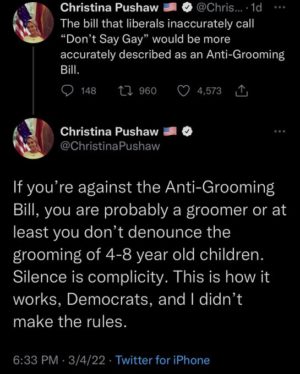
“The bill that liberals inaccurately call ‘Don’t Say Gay’ would be more accurately described as an Anti-Grooming Bill,” Florida Gov. Ron DeSantis’ press secretary, Christine Pushaw, tweeted on her personal Twitter account. “If you’re against the Anti-Grooming Bill, you are probably a groomer, or at least you don’t denounce the grooming of 4-8-year-old children. Silence is complicity. This is how it works, Democrats, and I didn’t make the rules.”
Gray believes that the bill does not protect children and does nothing but harms the LGBTQ+ youth.
“The only people that the bill ‘protects’ are people who are afraid to see past conventional ideas about what people ”should” (as they see it) be like,” Gray stated. “These people are stuck in the past, and as a country, we have a duty to protect all of our citizens. Every. Single. One. No matter race, ethnicity, gender, sex, etc.“
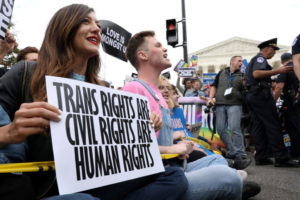
Other states, such as Tennessee, are considering a bill prohibiting schools from using books and instructional material that mentions gay, bisexual, or transgender issues or lifestyles. In Indiana, House Bill 1040 would prohibit teachers from discussing, in any context, “sexual orientation,” “transgenderism,” or “gender identity” without parental consent.
“It is an ominous invitation to lawmakers everywhere; I think they will [follow suit] unless President Biden does something,” Maxham stated. “Politicians aren’t letting kids come up with their own opinions by passing this bill and are basically creating a hateful generation. It’s gross. Idiotic. Hateful. Bigoted. Immature. Spiteful. Unnecessary. Misguided. And stupid.”
1969 U.S. Supreme Court made it clear in Tinker v. Des Moines Independent Community School District. that students of every age have First Amendment rights even in school. Many, like Gray, agree that the “Don’t Say Gay” bill silences students.
“’The Don’t Say Gay’ Bill is definitely in violation of First Amendment rights for students,” Gray stated. “It’s pretty clear that telling people, even young students who are still citizens, that they can not talk about or ask any questions regarding sexuality, identity, etc., is a violation of their rights.”
Senior Tess Harwood thinks that the “Don’t Say Gay” bill would be sheltering and erasing younger generations.
“Representation does not reduce the number of people that exist, ” Harwood said. “So saying gay less doesn’t mean that there will be less gay people; it just means that they’re in hiding more and can’t be open.”
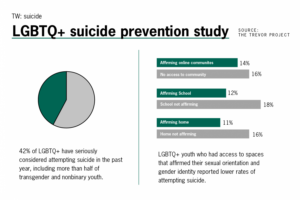
The Trevor Project (suicide prevention and crisis intervention organization for LGBTQ), estimates that more than 1.8 million KGBTQ+ youth ages 13-24 seriously consider suicide each year in the U.S. With The Trevor Project National Survey done in 2022, gathered that 42% of LGBTQ youth seriously considered attempting suicide in that year, with more than half being transgender and nonbinary youth.
“This bill will raise suicide and depression rates among LGBTQ+ youth. The damage will only become worse as more kids grow up under ‘[the] Don’t Say Gay’ bill,” freshman Max Dujmovic stated. “I used to pray to God every night to turn me normal. There have been periods of times where I have been severely suicidal as a result of people’s reaction to my trans identity. If they really cared about the kids, [legislators] would care about the gay kids, too.
Many Woodside members of the LGBTQ+ community felt that the bill would hurt generations to come, sympathizing with their past experiences. Those coming from sheltered communities where the conversation of sexuality and gender orientation are often looked down upon felt trapped and ashamed until high school. ![]()
“In my middle school, there were two openly gay kids and a handful of us that were like, ‘we believe that we are Bi, trans, etc.,’[but even then] we were just sheltered over the fact it was a Latino community,” Hernandez said. “It wasn’t something we could talk about. When we came to high school and saw people were open, there was the Gay-Straight Alliance (GSA), that we were like, ‘this is something we can be proud about’.”
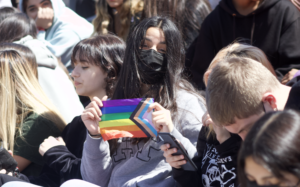
Some students with religious backgrounds also noted how hard it was to be open about their sexuality until high school.
“I went to a Catholic school for nine years,” Wik said. “I figured out that I was bi myself from a very young age, and I never really embraced it until eighth grade. [What] I experienced is somewhat internalized homophobia from my religious upbringing.”
Wik stated that because gender identity and sexual origination isn’t a common discussion in Catholic schools, it harms LGBTQ+ kids and young adults even without a bill that forbids it.
“My school wasn’t like homophobic or anything; they just didn’t talk about it. [Even then] it was still in outdated textbooks like homosexuality is one of the big sins, which is damaging for me and for queer kids who are just trying to find themselves because it’s hard enough when you’re growing up.
The 2018 LGBTQ Youth Report conducted by the Human Rights Campaign found that school environment has “a critical impact on [LGBTQ Youth’s] overall health and well-being.” For sophomore Nicki Weppner and others, being in a supportive and accepting community wasn’t enough to reassure them as a part of the LGBTQ+ community.
“I don’t have a lot of internal homophobia that other queer people do because they live in an environment where there aren’t allowed to show that side of themselves,” Weppner stated. “Even though I was still in an accepting environment, it still wasn’t being taught that this was valid. I had thoughts about there having to be a feminine and a masculine figure in a relationship, because that’s what I’ve been told, I thought it had to be true, right? I had to do that research on my own, actively, and little kids don’t have access to research. They need to be told that.”
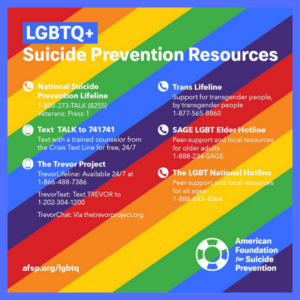
Those that are part of the LGBTQ+ community here at Woodside and in the Bay Area recognize that even with resources available to them it is still hard, and they can’t imagine the struggle that LGBTQ+ people have in unaccepting communities.
“It’s impossible to imagine how hard they are struggling,” Harwood stated. “That one kid who’s gay in Florida, [with] no support system, in school or outside. There are so many kids struggling with that here, when there are so many support systems, through therapy, through schools, through Planned Parenthood, through clubs in the Bay Area and there’s still so many people struggling.
Though this bill only seems to affect the people of Florida, this bill is not just a Florida issue as more states follow suit creating anti-LGBTQ+ legislation. These bills threaten the progress America has made for the LGBTQ+ communities here at Woodside and around the country.
“This bill affects us at Woodside High School because, unfortunately, Florida is a part of the United States, and we can’t just act like we don’t know them or don’t see what they are doing,” Gray concluded. “Especially now, our LGBTQ+ community at Woodside is probably feeling pretty discouraged, angered, and saddened, as we all should be, no matter what group you assign yourself with. This bill is not just a them issue. It’s an us issue, because if the rest of us don’t protest, sue, fight back, and protect the LGBTQ+ community; we are then just letting this happen.”


